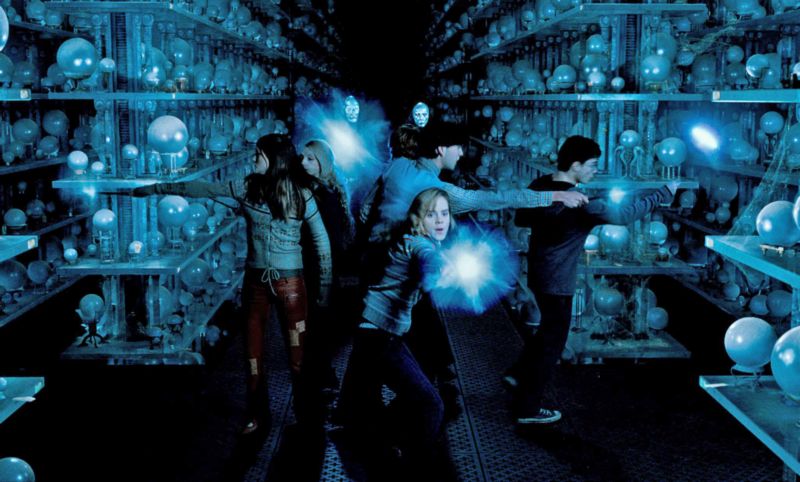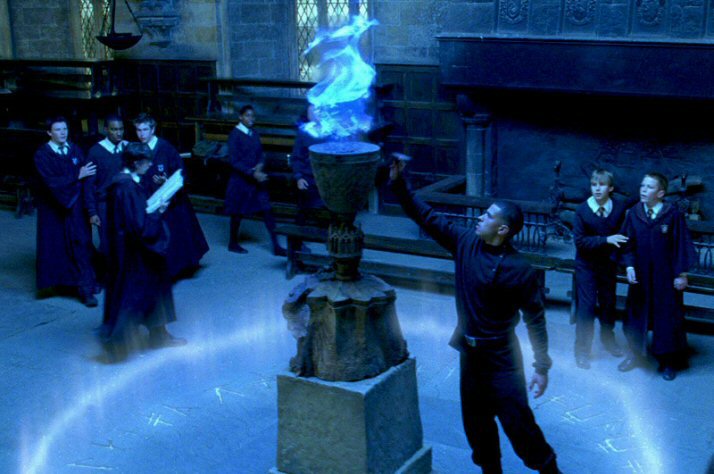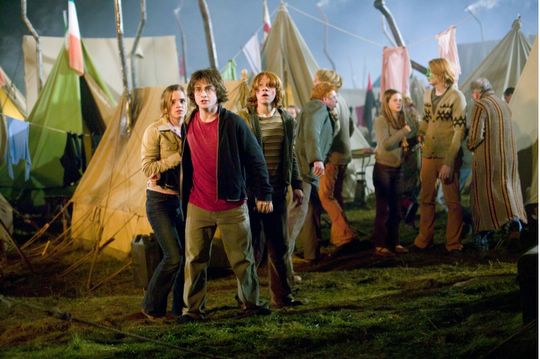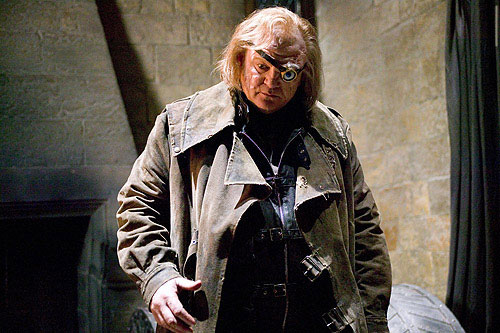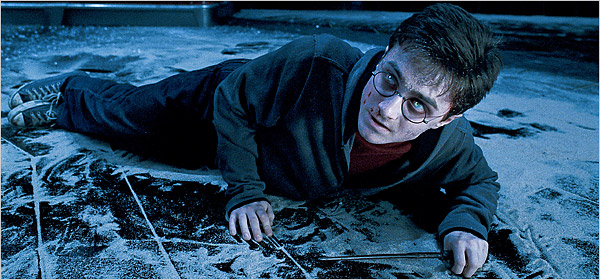
Harry Potter and the Order of the Phoenix, director David Yates’ take on the fifth installment of J.K. Rowling’s (soon-to-be-completed!) series, is, I’m happy to report, a somber, suspenseful return to the increasingly dire matters at Hogwarts, and well in keeping with the higher standard set by Alfonso Cuaron and Mike Newell in the past two movies. While I think Newell’s Goblet of Fire remains my favorite film outing thus far, this one is right up there in my estimation, and given how much less Yates had to work with, that’s rather impressive. (For all its girth, Book V felt basically like a holding action to me — the wider narrative arc didn’t progress all that much from the end of Goblet to the end of Order, and the story suffered from a wham-bang action climax that didn’t really work on paper (it comes off better on-screen.)) Indeed, Yates’ Order not only captures my most prominent impressions of the book — Harry’s burgeoning teenage moodiness, the growing sense among the students of grim times ahead and important events already set in motion — but also significantly streamlines and distills Rowling’s most-sprawling tome into two-and-a-half hours of sleek, well-paced cinema. No mean feat of magic, that.
By the start of Order, Voldemort (Ralph Fiennes) is loose, Cedric Diggory is dead, and Harry Potter (Daniel Radcliffe), once more at the mercy of the Dursleys for the summer, is poised on the verge of adolescent rebellion. He hasn’t heard a pip from friends Ron (Rupert Grint) and Hermione (Emma Watson) for months, nor has he heard any news of goings-on in the magical world. So it is with no small amount of surprise and consternation that Harry finds himself first attacked by Dementors one gloomy evening, then expelled from Hogwarts — by authority of the Ministry of Magic — for using his wand to defend himself. Brought back into the magical loop by these events, Harry discovers that many of his former allies, including godfather Sirius Black (Gary Oldman), have banded together to re-form the Order of the Phoenix in preparation for Lord Voldemort’s next move. More troubling, it seems Minister of Magic Cornelius Fudge (Robert Hardy) is not only not inclined to believe Harry that You-Know-Who has returned, but also views Harry and his mentor Albus Dumbledore (Michael Gambon), as a political threat, and has turned the general public and popular press against them both. Finally, to further complicate Potter’s prospects, Fudge dispatches one Dolores Umbridge (Imelda Staunton) to Hogwarts with a ministry mandate to stamp out both dark sarcasm and Defense against the Dark Arts in the classroom. Thus hemmed in, Harry, Ron, and Hermione find once more they need to take matters in their own hands, and begin to defiantly assemble what they call Dumbledore’s Army, a student organization dedicated to preparing for the worst. But, all the while, Lord Voldemort is up to his own tricks…and what good is Dumbledore’s Army if its young, bespectacled leader is already hopelessly compromised by his still-unexplained connection to the Dark Lord?
As the paragraph above attests, there’re a lot of balls in the air this time around, but Yates, screenwriter Michael Goldenberg, & co. do a solid job of keeping everything moving without doing grievous harm to any of the many included subplots. (Several have been excised regardless, such as this year’s Quidditch match. No real loss, imho.) And throughout, what Order of the Phoenix gets most right — in fact, one could argue it’s actually done better here than in the book — is the feeling that things are simmering to a boil. Hermione, Ron, and especially Harry have grown from wide-eyed, trusting children to gawky, hormonal teenagers (and better actors, for that matter), seething with imminent rebellion against the powers-that-be, and their world has similarly gone from a colorful, fantastic, and ever-so-occasionally dangerous realm of magical delights to a gray, ominous land of hidden agendas, political propaganda, fallible adults, and fatal consequences. In the last movie, Harry’s Hogwarts cohort were on the threshold of early adolescence, and had just begun to discover the tantalizing mysteries of the opposite sex. Here, slightly older, they come to another classic teenage rite-of-passage: finding that the world — and, more often that not, the people in charge — aren’t all they’re cracked up to be, and that they may even actually be out to get you.
Of course, Yates is helped out tremendously in bringing Order to life by his ever-expanding Dream Team of British thespians. Imelda Staunton, as the main new cast member, is note-perfect as Umbridge. A pink-festooned, unholy cross between the Church Lady and arguably the real You-Know-Who of Rowling’s books, Margaret Thatcher, she’s like something out of a Roger Waters fever dream (and continues the “The Tories are Coming!” subtext I noted in my review of the last movie.) Even with Staunton aside, tho’, Order is packed to the brim with quality actors reprising their roles from the first four films — Oldman, Hardy, Brendan Gleeson, Maggie Smith, Michael Gambon, Emma Thompson, Jason Isaacs, Robbie Coltrane, etc., and particularly Fiennes and Alan Rickman. They’re all excellent, and frankly it’s good fun just to see so many of them around again to help further flesh out the Potterverse. (Although, having seen Naked and The History Boys since Goblet, I’m slightly more concerned about Harry hanging around the likes of Remus Lupin (David Thewlis) and Vernon Dursley (Richard Griffiths)…what would the Umbridges of the world have to say about that?)
